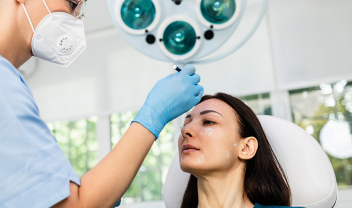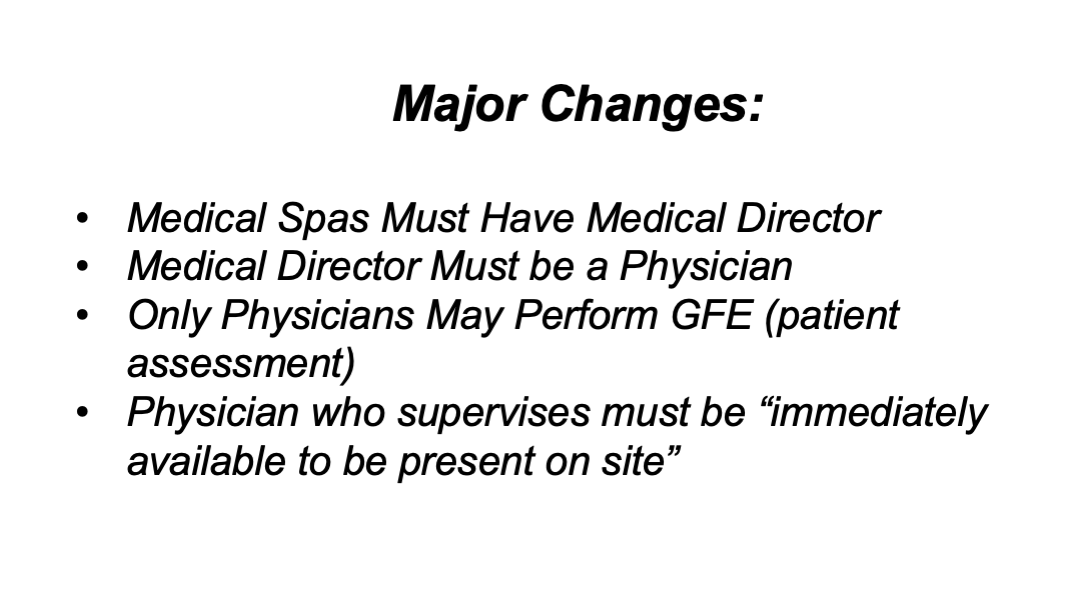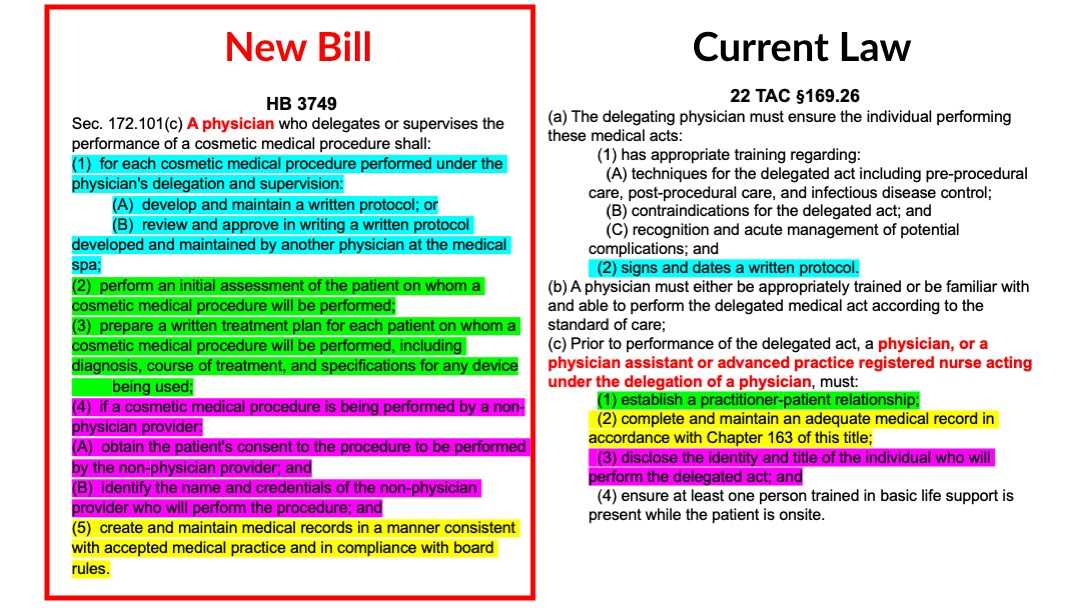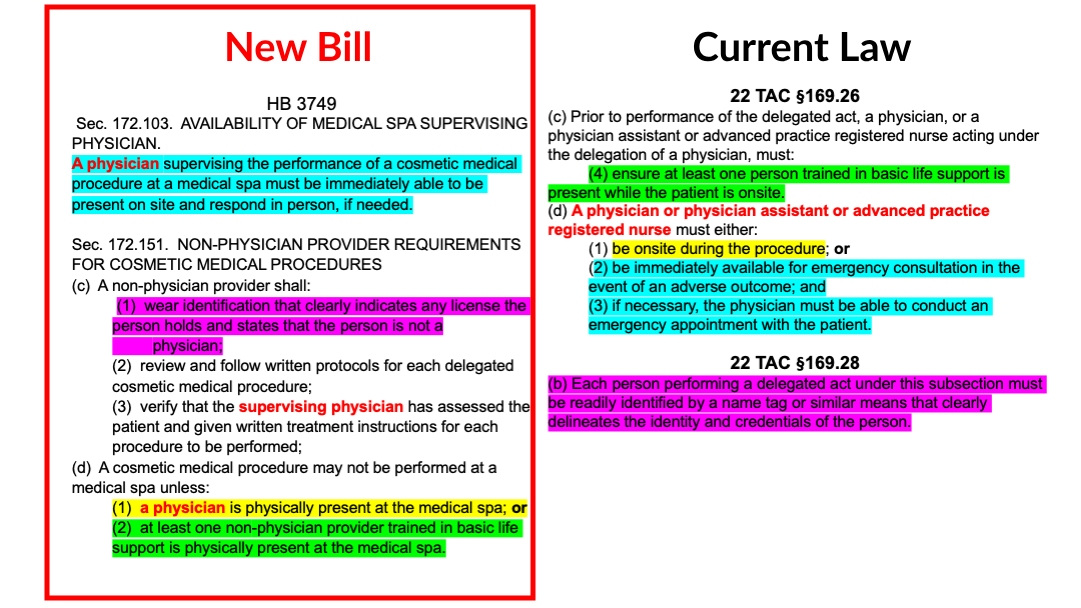AmSpa's position on the original text of HB 3749
Texas House Bill 3749, dubbed "Jenifer's Law," was drafted in reaction to the tragic death of Jenifer Cleveland during an IV treatment in July of 2023. Rather than regulate IV treatments or unlicensed providers, however, the bill restricts licensed NPs and PAs, drastically curtailing what they are able to do in a medical spa practice.
The bill seeks to regulate med spa practices "including the performance of cosmetic medical procedures and the provision of elective intravenous therapy" and defines cosmetic medicine as including "the administration of a neuromodulator or dermal filler, an ablative or non-ablative laser procedure, and a procedure using an energy-emitting device."
It further states that only physicians may administer the initial patient assessment (Good Faith Exam), diagnose and create treatment plans, taking these duties away from licensed PAs and NPs. Additionally, with this bill only physicians would be able to supervise RNs and other providers performing medical aesthetic treatments and requires supervising physicians to be on-site or immediately available.
"If this bill were to pass, for cosmetic medicine the PA or NP wouldn't be able to examine patients or prescribe those procedures. They'd still have their regular scope in primary care and other things like that, but for med spa type procedures this would be a physician-only proposition." -Patrick O'Brien, JD, General Counsel, AmSpa
Background
On March 4, 2025, Representative Angelia Orr filed HB 3749 in the Texas Legislature. Dubbed “Jenifer’s Law” by some in the press, it was purportedly filed in response to the tragic death of Jenifer Cleveland following an intravenous (IV) infusion treatment administered by an unlicensed person at Luxe Medical Spa in Wortham, Texas, July 10, 2023.
While most of the bill generally mirrors current Texas law for medical spas and IV therapy clinics, there are multiple new provisions that, if passed, would drastically and detrimentally change the current landscape in Texas.
First, HB 3749 excludes nurse practitioners (NPs) and physician assistants (PAs) from performing patient assessments, writing treatment plans and orders, and providing supervision functions (good faith exams and general supervision) at medical spas. These duties would only be able to be performed by a physician. Under Texas’s current rules, and the rules of virtually every other state, the patient assessment, treatment, order, and supervision functions in a medical spa can be provided by NPs and PAs, along with physicians. HB 3749 removes that function entirely, effectively giving both NPs and PAs the same scope of practice and authority as registered nurses (RNs) in medical spas. It is important to note that, in all other settings, NPs and PAs retain their status as highly trained prescribing practitioners.
Second, HB 3749 states that every medical spa must have a physician, again excluding NPs and PAs, “immediately available … to be present” at the facility, if needed. In order for a physician to be “immediately available” to be on-site, the physician would need to be physically on-site and present at the location every day. Because of this provision, every Texas medical spa would require an on-site physician at all times, a requirement that is not in place in other areas of medicine in Texas or other states.
Finally, HB 3749 also provides basic rules for elective IV therapy. This section is much less restrictive and contains none of the assessment and physical presence requirements of the medical spa bill, despite Jenifer Cleveland’s tragic death occurring due to IV therapy performed without supervision by an unlicensed person. It also allows the physician to delegate the act of prescribing or ordering an elective IV to an RN using a prescriptive authority agreement, something not allowed in other areas of healthcare.
Taking the above provisions into consideration, this passage of this bill would not make medical spas safer. It does not address the very real issues that caused Ms. Cleveland’s unfortunate death in July of 2023: unlicensed and undertrained providers, lack of supervision, and the blatant disregard of Texas’ extensive existing medical spa regulations.
AmSpa's Position
- AmSpa opposes this bill and encourages its members and the medical aesthetics industry to do the same. AmSpa will work hard to defeat this bill and asks for the support of the industry to helps its efforts.
- AmSpa believes that the family of Jenifer Cleveland deserves accountability from medical spas that employ unsupervised, unlicensed, or undertrained individuals to perform medical treatments, or who disregard existing medical regulations.
- Although medical aesthetics is overwhelmingly a safe, trustworthy, and professional industry that prioritizes patient safety, incidents such as Jenifer Cleveland’s untimely death at Luxe Med Spa are tragic, unacceptable, and must never be tolerated in any area of health care.
- HB 3749 makes medical spas less safe by needlessly removing trained and qualified advanced practitioners from assessment and supervisory roles.
- HB 3749 fails to address the existing issues faced by the medical aesthetics industry, including unlicensed and undertrained providers, illegally sourced product, lack of trained supervision, and lack of education on medical regulations.
- AmSpa maintains that medical spas are medical facilities. The medical laws and regulations of each state govern medical practice in that state, and medical spas are necessarily included in that regulatory framework.
- The State of Texas has extensive, thorough, and specific regulations addressing the practice of medical aesthetics. These regulations provide a safer, more robust, and more specific regulatory framework that HB 3749 provides, and, if adhered to and enforced, would likely have prevented the death of Jenifer Cleveland.
- In the event that any state seeks legislation or regulation addressing medical aesthetics individually, AmSpa supports a clear, straightforward legal framework that comports with existing state health care laws, creates standardized practice and training requirements, and allows for consistent enforcement. It opposes overly excessive, limiting, or restrictive regulations inconsistent with existing principles of health care law.
- AmSpa supports well-informed, practical regulations that ensure patient safety while avoiding reactive legislation that overreaches or harms an already safe industry.
- AmSpa is committed to rejecting any so-called "medical spas" that fail to follow the laws and regulations of medical practice or engage in unsafe and/or unethical practices.
- AmSpa is committed to educating the industry and legislatures about the medical aesthetics industry in order to encourage meaningful and consistent enforcement, and to prevent unsupervised, unlicensed, or undertrained individuals administering medical treatments.










